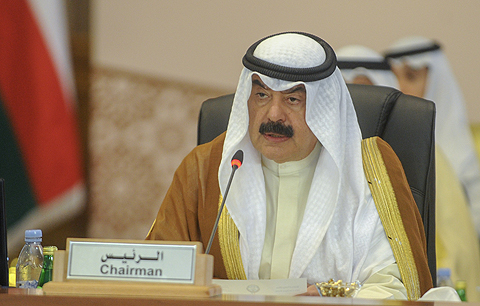 Kuwait's Deputy Foreign Minister Khaled Al-Jarallah.
Kuwait's Deputy Foreign Minister Khaled Al-Jarallah.KUWAIT: A protracted conflict involving the Gulf Cooperation Council (GCC) is not insurmountable, Kuwait's Deputy Foreign Minister Khaled Al-Jarallah said yesterday, hoping the standoff will not threaten the unity of the bloc. "We will do everything in our power to preserve peace, security and our existence," he said during ministerial talks dealing with joint work in the Gulf region. He said an issue of such enormity is too serious to be downplayed, but the "collective wisdoms of Gulf leaders will get us past this hurdle".
The talks in Kuwait are a "glimmer of hope" that the cohesion of the bloc will remain intact, he added, saying such meetings are needed to protect a bond that has stood the test of time. Jarallah said since the GCC ministerial council's inception in 2008, tremendous progress has been made over plans to conduct joint work and keep the camaraderie within the regional bloc alive.
GCC Secretary General Abdullatif Al-Zayani thanked HH the Amir Sheikh Sabah Al-Ahmad Al-Jaber Al-Sabah for his commitment to bringing the people of the Gulf region closer together. He highlighted the need to expedite the passage of legislations that reinforce solidarity among Gulf nations, revealing that annual gatherings will be held to inform the people of the GCC of achievements that have been made in that regard. Such initiatives are a testament to the bloc's eagerness to support joint work and cooperation, the GCC chief explained.
Jarallah also said he hoped oil production would pick up again in fields jointly operated by Kuwait and Saudi Arabia, citing ongoing negotiations over the matter. "We hope to solve this dispute with Saudi Arabia so that oil production in the neutral zone can continue," he told reporters after the ministerial talks. The two countries halted output from the jointly run oilfields in the so-called Neutral Zone more than three years ago, cutting some 500,000 barrels per day or 0.5 percent of global oil supply. Jarallah revealed Kuwait has signed a memorandum of understanding with the European Union over cooperation in various fields, including a plan to open a Kuwaiti office at NATO's headquarters in Brussels.
Jarallah said Kuwait still calls on Iran to have normal relations with its neighbors on the basis of clear foundations, mutual respect and non-interference in other countries' internal affairs. He said if Iran observes such foundations and principles, "then there will be no need for sanctions". Jarallah reiterated Kuwait's commitment to US sanctions on Iran. As for an international effort to bring an end to the war in Yemen, he said: "What is going on in Yemen is painful. Still, there are indications that are hoped to be positive and to put an end to the conflict". He noted recent US statements on the conflict in Yemen reflect seriousness for pushing or resuming negotiations.
Separately, Kuwaiti Finance Minister Nayef Al-Hajraf said yesterday it is significant to fulfill the GCC leaders' goals by creating a robust economic bloc capable of emulating other global entities. Addressing a GCC financial and economic committee meeting, Hajraf said: "The world is the scene of swift economic developments and renewed challenges that ought to be addressed." He said such challenges could be conquered by means of developing uniform visions and promoting Gulf economic cooperation, and meeting the GCC leaders' expectations of economic integration.
"There are great responsibilities and grave challenges that require us to translate orientations into programs of action, rendering ambitions into tangible reality and harnessing energies and potentials to attain the aspired goals," Hajraf added. He spoke highly of the gathering as a platform for sharing views and offering positions in full clarity and transparency with a view to propping up Gulf economic cooperation. The GCC meeting focuses on an array of issues and subjects bearing on the development of financial and economic policies in the region, contributing to beefing up existing cooperation and notching up economic integration, he noted.










